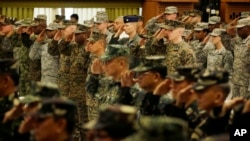More prominent security experts are joining the call for the U.S. to extend its security treaty with the Philippines to the defense of shoals and islands currently controlled by the Philippines in the disputed area of the South China Sea.
Seth Cropsey, former Deputy Assistant Secretary of Defense, told VOA that the issue should be treated the same way as the defense of Senkaku Islands, currently controlled by Japan but also claimed by China, which calls them the Diaoyu Islands.
“The object is the same, to honor the treaty obligation with the Philippines, also to defend the area from the increasingly aggressive and ambitious China that is using military force and threat of it to achieve its ends,” Cropsey said.
Walter Lohman, director of the Center for Asia Studies at the Heritage Foundation, another Washington based think tank, told the Foreign Affairs Committee of the U.S. House of Representatives recently that it's time for the U.S. to provide security assurance to its staunch ally in Asia.
"I think we should change our position on the application of the U.S.-Philippine security treaty to cover features in the South China Sea that are currently occupied by the Philippines and under its jurisdiction," Lohman said. "Currently, we're ambiguous in that regard."
China claims most of the South China Sea and is actively pursuing a rapid program of artificial island construction in the region. China is also building military facilities on these shoals, posing new threats to islands in the area controlled by the Philippines.
Following a stand-off between Chinese ships and the Philippine navy three years ago, China took control of Scarborough Shoal, a rich fishing ground that the Philippines says is within its exclusive economic zone.
Following Words with Actions
Cropsey, now a senior fellow and director of Center for American Seapower at Hudson Institute, a Washington think-tank, believes the only risk the United States would run in declaring its security treaty with the Philippines is “by saying something and then not backing it up with deeds.”
“If the U.S. were to say ‘we would include the islands and reefs that are administered and controlled by the Philippines as part of the defense agreement we have with our ally,’ and then not put ships in the area, not send patrol there over those islands and reefs … that would be a signal to China that we are not serious about our obligation,” Cropsey said.
However, Cropsey added, it’s impossible to “read the Administration’s mind.”
“The Administration has blown hot and cold on China - sometimes, it takes a more forward leaning stance … and sometimes, it sort of leans back,” he said. “I hope more people talking about the subject openly will encourage the administration to reconsider it and think about the Philippines in the same way as the administration thinks about Japan, which is, it is a long-time friend and ally and extremely important politically, geographically and strategically for that part of the world.”
Obama Administration Stance
When asked by VOA about the current U.S. policy on the issue, Daniel Russel, Assistant Secretary of State for East Asia, said on Tuesday that Washington still honors the treaty with Manila. Russel said the Obama Administration would not rule out any military option to the perceived common threat in the region.
“Under the treaty, we would consult immediately to consider responses to a perceived common danger.” Russel said. “I think the United States and the Philippines by our actions have shown we are committed to finding lawful and peaceful ways to resolve differences and to deter and minimize the risk of any kind of conflict.”
Meanwhile, the Philippines has been actively cooperating with the U.S. in a variety of military operations, including allowing U.S. Navy planes to fly out of Clark Air Force Base to conduct reconnaissance flights near features recently built by China in the Spratly Islands.
Strategic Ambiguity
However, some scholars in the Philippines don’t think the U.S. should and would openly extend the treaty to defending features in the South China Sea controlled by the Philippines soon.
“I think the U.S. should maintain strategic ambiguity regarding the matter, that would put China off balance,” Professor Renato Cruz De Castro of De La Salle University in Manila said in an interview with VOA. “You cannot compare U.S.-Japan with U.S.-Philippines relations for a number of reasons.”
The most important reason, De Castro said, is that extending the treaty would “automatically bring the U.S. and Philippines in a head-on confrontation with China.” He said the Philippines maintains a much weaker military force than that of Japan.
De Castro believes that Manila could tolerate the strategic ambiguity and has not asked the U.S. to extend the treaty.




